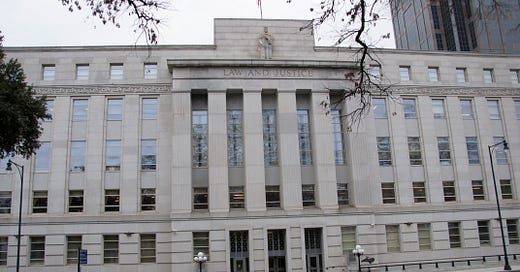Confusion continues after North Carolina Supreme Court rules in Riggs case
Why are only some ballots affected?
By Stephen Richer
“I expected that, when the time came, our state courts surely would embrace the universally accepted principle that courts cannot change election outcomes by retroactively rewriting the law.
“I was wrong.”
—Justice Richard Dietz, dissenting
On Friday, the Supreme Court of North Carolina wrote the latest chapter in the election for one of North Carolina’s seven Supreme Court seats—an election that took place five months ago, on Nov. 5.
At issue was a ruling from the state’s Court of Appeals that reopened the validity of more than 60,000 votes and threatened the 734-vote victory of the Democratic candidate—and current state Supreme Court justice—Allison Riggs over the Republican candidate, Jefferson Griffin, who is a current judge on the state’s Court of Appeals.
For details on the highly unorthodox Court of Appeals ruling, see the piece I wrote at The Contrarian last week, the article by Mike Sacks and Evan Vorpahl, or Jen Rubin’s interview of Riggs.
The Supreme Court’s 4-2 order from Friday affirmed part of the Court of Appeals’ ruling but pared down the number of contested votes from 60,000 to now just a few thousand at most.
The order reversed the Court of Appeals on the voter registration record question (by far the biggest category); it affirmed the Court of Appeals’ decision on military and overseas voters but doubled the cure period from 15 business days to 30 calendar days, and it affirmed the Appeals Court’s throwing out of 267 votes from U.S. citizens born abroad to North Carolina voters.
But the six-page Supreme Court decision still leaves us with a highly irregular ruling and the possibility that the November 2024 election result could be overturned.
Now that the state-level process has been exhausted, Riggs has asked for a stay on federal grounds from the Eastern District of North Carolina. Stay tuned.
That federal request will open a whole host of issues, but I’m most interested in the following:
1) When does the government’s fault translate to the voter’s loss?
Election law typically holds that government mistakes should not disenfranchise already-cast votes from valid voters.
The state Supreme Court reminded the Court of Appeals of this principle as it pertained to one category of contested voters: “Under this Court’s longstanding precedent, mistakes made by negligent election officials in registering citizens who are otherwise eligible to vote ‘will not deprive the [citizens] of [their] right to vote or render [their] vote[s] void after [they have] been cast.’”
But, weirdly, the court did not do so as it pertains to military and overseas voters, even though any mistake there was also the fault of the government, not voters. The Supreme Court admits this inconsistency but offers no explanation (“For the second category--military or overseas ballots cast under Article 21A for whom the Board of Elections failed to follow the express requirements of N.C.G.S. sec. 163-230.1”) (emphasis added).
Accordingly, North Carolina voters are left in the weird position that some government mistakes don’t invalidate votes but other government mistakes do invalidate votes.
2) The State Supreme Court’s, like that of the Court of Appeals, just doesn’t understand “curing.”
The state Supreme Court expanded the number of days that military and overseas voters have to remedy the government’s error and “cure” their ballots.
But whether 15 business days (Court of Appeals) or 30 calendar days (Supreme Court), the court still shows a naive optimism of ballot curing. As I wrote last week, some of the voters from the November election are now dead. Others will not be interested in taking the time to cure their ballots when the only contest left is one state Supreme Court seat and not the presidential race or the governor’s race. Others will have moved and be hard to contact. And still others will have moved to new states and no longer feel comfortable taking an official election action in a previous state.
My guess is that if this rule stands, fewer than 50% of the affected voters will actually cure their ballots.
3) Why does this only pertain to select counties and only one race?
North Carolina has 100 counties. But the plaintiff’s challenge and the state Supreme Court’s ruling seems to only apply to between one and six counties, all of which are Democratic-leaning counties. Why wouldn’t this seeming post-facto rule change apply to all 100 counties?
Additionally, shouldn’t the invalidation of certain voters pertain to all races from the November general election, and not just one race?
As I wrote at the end of my article from last week, we’re still in a confusing situation, and that’s not a good thing.
Stephen Richer, a Republican, is the former elected Maricopa County recorder, responsible for that county's elections. He is chief executive of Republic Affairs, a senior fellow at the Harvard Kennedy School's Ash Center, and a board member of State Democracy Defenders.





How is it possible that only the supreme court vote is affected by this verdict? I don't care how many ballots are questionable, be it just a few thousand or 65,000, every position on the ballot would appear to be invalid. Only in a red state and only when the loser is a republicon do things like this happen!
I'm sure this will go to the US "supreme" court. It will be interesting to see how they rule.
There is inconsistency because the NC Republican Supreme and Appeals Court want desperately to steal this election. And they must be stopped by the Federal courts if all else fails.